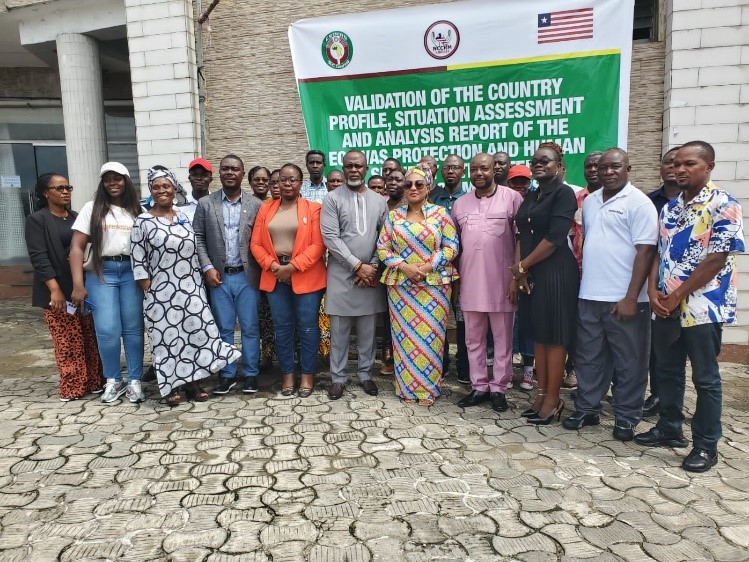The Economic Community of West African States (ECOWAS), in partnership with the Liberian government and civil society organizations, convened in Monrovia to validate a crucial report on the state of protection and human security in Liberia. This collaborative effort culminated in the adoption of the Situation Assessment and Analysis Report of the ECOWAS Protection and Human Security Integrated Coordination Mechanism (ECO-PHSICM), a significant stride toward bolstering Liberia’s protective frameworks and enhancing human security within the nation. The report represents a comprehensive analysis of the prevailing human security landscape, pinpointing vulnerabilities affecting diverse population groups, especially women, children, refugees, and internally displaced persons (IDPs). It also evaluates current institutional responses and proposes key recommendations to improve coordination mechanisms for better protection outcomes. The validation meeting, held under the auspices of the National Center for the Coordination of Response Mechanism (NCCRM), underscored the importance of multi-stakeholder engagement in addressing complex human security challenges.
The comprehensive report acknowledges Liberia’s existing legislative frameworks and national policies aimed at safeguarding human security. However, it also highlights the persistent challenges in their implementation due to constraints such as limited resources, weak institutional capacity, and coordination gaps. These obstacles hinder the effective translation of policy into practice, leaving vulnerable populations exposed to various risks. The report emphasizes the need for strengthened institutional capacities, increased resource allocation, and improved inter-agency coordination to bridge the gap between policy and implementation. This holistic approach is crucial for ensuring that the protective mechanisms are robust and reach those who need them most.
Mr. Arthur Bestman, Executive Director of NCCRM, emphasized the report’s significance in identifying critical intervention areas and recommending strategies to enhance protection through effective multi-stakeholder coordination, aligning with ECOWAS and international standards. He noted that the report’s alignment with the ECO-PHSICM framework facilitates regional comparisons and collaborative efforts. It leverages key ECOWAS documents, including the Revised Treaty, the Protocol on Conflict Prevention, and the ECOWAS Conflict Prevention Framework, to provide a contextualized analysis of Liberia’s human security situation. Mr. Bestman characterized the assessment as a pivotal examination of Liberia’s multifaceted post-conflict challenges, including socio-economic vulnerabilities, thereby offering valuable insight into the complex interplay of factors impacting human security.
Madam Josephine Nkrumah, ECOWAS Resident Representative to Liberia, underscored the national significance of the validation exercise, highlighting its relevance to every Liberian citizen. She emphasized the importance of incorporating diverse voices, insights, and expertise to ensure the report effectively addresses the core issues of human protection and national security. Madam Nkrumah advocated for collective action, robust engagement, and increased financial support to address the root causes of conflict, reiterating ECOWAS’ commitment to conflict resolution, democracy, and good governance. She further stressed the significance of ECOWAS protocols focusing on critical human protection issues, such as trafficking, child protection, gender-based violence, and humanitarian law, as essential elements for building a resilient society. Her call to action emphasized the urgency of the validation process and the need for a unified, national approach to address the challenges outlined in the report.
The validation process involved in-depth discussions guided by expert presentations, facilitating a thorough examination of the report’s findings and recommendations. Participants were encouraged to identify challenges, strengths, and overlapping responsibilities to enhance coordination and ensure a comprehensive and impactful outcome. Madam Nkrumah urged the Liberian government, particularly the Ministry of Internal Affairs, to spearhead the decentralization of the national agenda, ensuring that protection interventions reach communities throughout the country. This decentralized approach aims to tailor interventions to local contexts and ensure that the most vulnerable populations, regardless of location, benefit from the enhanced protection mechanisms.
Mr. Philip M. Kollie, National Network Coordinator of the West Africa Network for Peacebuilding (WANEP-Liberia), stressed the importance of collaborative efforts to validate and implement the report as a policy tool for addressing human security and sectoral challenges. He highlighted the report’s potential to strengthen existing systems and provide better protection for the most vulnerable members of society. Following its validation and adoption, the final report will be submitted to the Government of Liberia through Vice President Jeremiah Kpan Koung and ECOWAS for further action. This signifies the transition from assessment and analysis to concrete action, with the report serving as a roadmap for future interventions and policy adjustments aimed at strengthening human security in Liberia. The collaborative nature of the entire process, from assessment to validation, demonstrates a commitment to shared responsibility and a collective approach to addressing complex human security challenges in the region.














